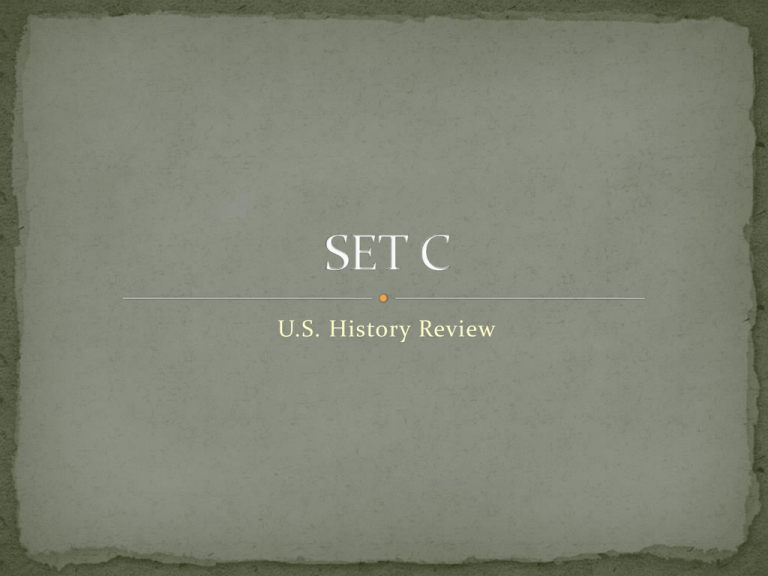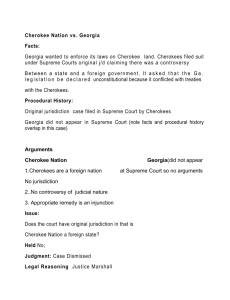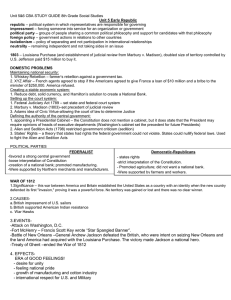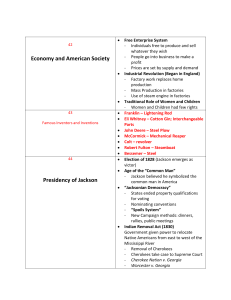SET C
advertisement

U.S. History Review The major argument at the Constitutional Convention between the the Federalists and the Anti-Federalists was over the role of the— A. indentured servants. B. women’s suffrage. C. monetary currency. D. Federal government. D. Federal government. Although the United States Supreme Court stated that the Cherokee Nation in the state of Georgia could not be forcibly removed, the state ignored the ruling and forcibly removed them anyway. Which of the following represents a reason Cherokee people were forced off their land in the state of Georgia? A. Georgia felt concerned for the welfare of the Cherokee. B. Georgia wanted the lands for wheat production. C. Georgia wanted to develop a tourist industry. D. Georgia wanted the land to grow more cotton and gold had been recently found in the state of Georgia. D. Georgia wanted the land to grow more cotton and gold had been recently found in the state of Georgia. The 1823 declaration that stated the countries of the Western Hemisphere would no longer be regarded “as subjects for future colonization by any European powers” was the— A. Monroe Doctrine. B. Anti-Colonization Treaty. C. Adams-Onis Treaty. D. Washington’s Farewell Address. A. Monroe Doctrine Which excerpt of the Constitution expresses the principle of federalism? A. “All legislative powers herein granted shall be vested in a Congress of the United States “. B. “The President shall have power to fill up all vacancies that may happen during the Recess of the Senate”. C. “The judges, both of the supreme and inferior courts, shall hold their offices during good behavior”. D. “The powers not delegated to the United States…are reserved to the States respectively”. D. “The powers not delegated to the United States…are reserved to the States respectively”. Which of the following was a defining characteristic of the Era of Good Feelings? A. The United States ceded territory to Great Britain in an attempt to avoid war. B. There was a renewed sense of nationalism. C. Evangelical revivalists challenged religious traditionalists. D. Many states called for a restructuring of the federal government. B. There was a renewed sense of nationalism Many Americans protested the United States’ war with Mexico and thought it was unnecessary because they said it was primarily a war— A. for renewable resources B. protecting America C. against slavery D. to gain territory D. to gain territory B. Sped up the process of urbanization The Declaration of Independence shares which of the following with the Magna Carta? A. Emphasized the importance of military power. B. Further empowerment of the government. C. Limited influence of the legislature. D. Certain rights were assured by the government. D. Certain rights were assured by the government. Which of the following characterized the First Great Awakening? A. Fiery sermons by religious leaders like Jonathon Edwards. B. Growth of religious enthusiasm throughout the colonies. C. The founding of new colleges and universities. D. All of the above. D. All of the above. He has made judges dependent on his Will alone for the tenure of their offices and the amount and payment of their salaries---Declaration of Independence. Which of the following was created in response to the grievance above? A. National Treasury B. Presidential Cabinet C. Electoral College D. Supreme Court D. Supreme Court Which of the following is a responsibility of state governments under Federalism? A. School systems B. Postal Service C. Economic System D. Armed Forces A. School systems The significance of the Supreme Court case of Marbury v. Madison is that— A. it established the power of the Supreme Court to declare a law unconstitutional. B. it greatly strengthened state’s rights. C. it upheld the constitutionality of the National Bank. D. it established the separate by equal principle. A. it established the power of the Supreme Court to declare a law unconstitutional. An “unalienable right” refers to a right that— A. cannot be granted by the government. B. cannot be involuntarily forfeited by a United States citizen. C. can apply only to citizens of other countries. D. cannot be taken away without due process. D. cannot be taken away without due process. Thomas Hooker’s Fundamental Orders of Connecticut is considered one of the first documents that laid the foundation for with of the following? A. Colonialism B. Absolute Rule C. Self-government D. Socialism C. Self-government Which of the following founding fathers is considered the architect of the U.S. Constitution who laid out a plan to govern the country through the separation of powers? A. Abraham Lincoln B. Benjamin Franklin C. James Madison D. Dred Scott C. James Madison Alexander Hamilton created a three part plan to pay off the national debt: 1.pay off all war debts 2. raise the government revenue 3. create a National Bank As a result of gaining Southern support for this plan— A. Hamilton and Thomas Jefferson forged a political alliance B. the nation’s capital was relocated between Virginia and Maryland C. Hamilton lost out on running in the Presidential election of 1790 D. Thomas Jefferson was given Northern support for the Presidency B. the nation’s capital was relocated between Virginia and Maryland During the famous exchange at Jefferson’s birthday dinner party, Andrew Jackson toasted, “Our Federal Union–it must be preserved” John C. Calhoun replied with his own toast, “The Union–next to our liberty the most dear.” These remarks were meant to address— A. That sectionalism was to be respected B. The federal union versus states rights C. The lack of respect for Native American lands D. The promotion of manifest destiny B. The federal union versus states rights George Washington created the Judiciary Act of 1789 resulting in— A. Thomas Jefferson being elected to Vice President B. the formation of Washington’s first cabinet C. the creation of a National Bank by Alexander Hamilton D. the appointment of John Jay as Chief Justice D. the appointment of John Jay as Chief Justice Which of the following was the primary reason Alexander Hamilton urged Congress to pass a protective tariff? A. To protect the cotton industry in the South B. To support Southern imports. C. To encourage citizens to buy European products D. To encourage citizens to buy American products D. To encourage citizens to buy American products John C. Calhoun’s influence with Southern voters eventually resulted in the— A. ending of the Protective Tariff and passage of the Nullification Doctrine B. formation of the Democratic-Republican and Federalist political parties C. acceptance of the Federal government over states rights issues D. threaten of secession of South Carolina from the United States A. ending of the Protective Tariff and passage of the Nullification Doctrine What did Patrick Henry mean when he said that he “smelled a rat in Philadelphia tending towards monarchy?” A. he suspected the Confederation Congress would soon name Washington as King B. he considered the people of Philadelphia to be Loyalists and traitors C. he believed the Constitutional Convention would create a national government that was too strong D. he feared that the Confederation Congress might return the U.S. to the King of England C. he believed the Constitutional Convention would create a national government that was too strong The War of 1812 has been described by some historians as a “Second War of Independence.” This is because the War of 1812— A. freed the people of the Louisiana territory from the tyranny of French rule B. resulted in the abolition of slavery in all of the territory controlled by the United States C. demonstrated that the United States could defend itself against attack by European nations D. inspired the people of the United States to overthrow the government and write a new constitution C. demonstrated that the United States could defend itself against attack by European nations How did Washington’s Farewell Address impact foreign policy? A. it made government officials unhappy B. it caused Europe to distrust America C. it changed the perception of America D. it encouraged America to remain neutral D. it encouraged America to remain neutral Which President’s election was characterized by a belief in the common man and an increase in voter participation? A. James Monroe B. Andrew Jackson C. John Quincy Adams D. William H. Harrison B. Andrew Jackson President Andrew Jackson claimed that use of the spoils system increased democracy in the federal government because it A. removed property-holding qualifications for voting B. limited the role of the electoral college in presidential elections C. allowed larger numbers of citizens to hold office D. used nominating conventions to pick political party candidates C. allowed larger numbers of citizens to hold office President Andrew Jackson was involved in— A. confronting North Carolina’s protective tariff nullification B. vetoing a bill to recharter the Bank of the United States C. defending Native American rights around Georgia D. defending the U.S. southern border during the Mexican War B. vetoing a bill to recharter the Bank of the United States In response to the Supreme Court decision in the case of Worcester v. Georgia, Andrew Jackson said, “John Marshall made his decision …now let him enforce it.” Why was this decision significant to Andrew Jackson? A. The decision that slaves were property of their owner and can be bought, sold, and transported as such. B. The decision that established judicial review, thereby saying that the Supreme Court can declare laws unconstitutional. C. The decision that Cherokee cannot be forced off their lands as a result of the Indian Removal Act. D. The decision that set a standard for dividing and surveying western territories. . The decision that Cherokee cannot be forced off their lands as a result of the Indian Removal Act. In 1787, Ohio acquires statehood to become our 17th state of the United States. Which of the following legislature provided for the basis of Ohio’s statehood? A. Land Ordinance of 1785 B. Proclamation of 1763 C. Northwest Ordinance of 1787 D. Treaty of Paris of 1783 C. Northwest Ordinance of 1787 What was an economic reason for the belief in Manifest Destiny? A. Americans wanted to move west to make sure that other countries did not get there first B. Land speculators bought large parcels of land and sold it to settlers for a profit C. Settlers helped Native Americans build homes, schools, and hospitals in their reservations D. Religious groups like the Mormons moved west to escape religious persecution B. Land speculators bought large parcels of land and sold it to settlers for a profit Which one of the following complicated the process of California becoming a state? A. Native Americans and Californians allied themselves against the United States B. California’s admission as a free state would outnumber slave states C. California miners hunted down and killed many Native Americans D. African Americans fought against the Native Americans and the Californians B. California’s admission as a free state would outnumber slave states Our manifest destiny [is] to overspread and possess the whole of the continent which Providence [God] has given us for the development of the great experiment of liberty and …self government John O’Sullivan, “United States Magazine and Democratic Review” These remarks best reflect the point of view of which U.S. President— A. John Adams B. William Harrison C. James K. Polk D. Abraham Lincoln C. James K. Polk






